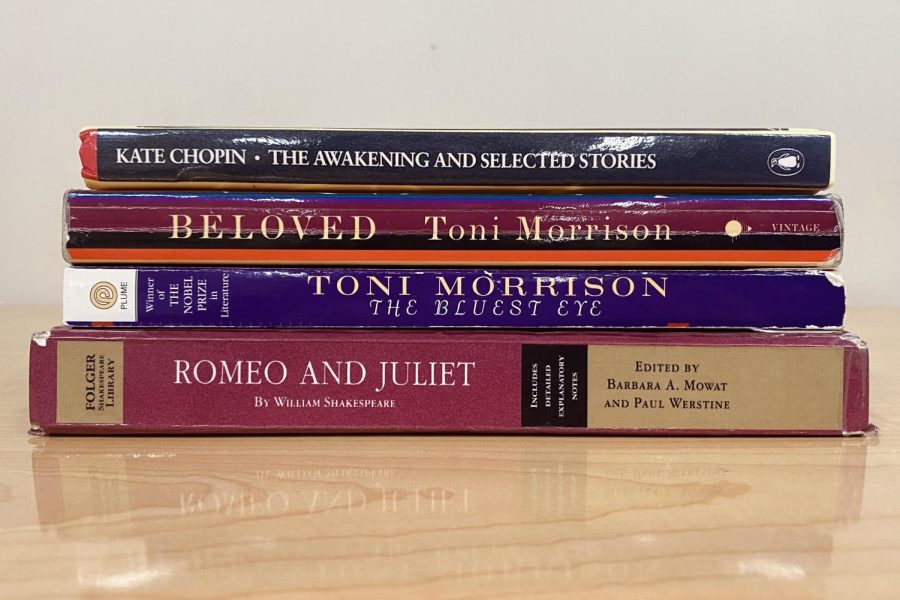New Virginia Law Could Restrict Books In School
“Beloved” and “The Bluest Eye” are some of the books that have been challenged for sexually explicit content.
April 19, 2022
In January, State Senator Bill DeSteph, R-Virginia Beach, introduced a bill that would require parental consent for students to check out “sexually explicit” books from school libraries. While the bill died in committee, it was one of several pieces of legislation, both in Virginia and in other states, concerning what students are able to read and learn in public schools.
On April 11, Governor Glenn Youngkin signed the bill into law requiring parents to be notified about any “sexually explicit” materials used in the classroom. The law, sponsored by State Senator Siobhan Dunnavant, R-Henrico, instructs the Virginia Board of Education to immediately create an example policy, preparing a process for which parents would be notified about sexually explicit reading materials in schools.
Under current ACPS policy, parents may request that their child be provided an alternative assignment for any book.
“Both as a teacher and as a parent, I disagree with the idea of requiring schools by law to notify parents before a class reads a book that might be considered ‘sexually explicit’ for several reasons,” English teacher Ayesha Ahmad said.
“First, who gets to define what sexually explicit is? One parent’s definition of sexually explicit may diverge widely from that of teachers, school boards, and even other parents, and that divergence may lead to too narrow a definition.”
Ahmad believes that teachers and schools have the best understanding of which books best support the curriculum and SOLs.
While the bill states that it should, “not be construed as requiring or providing for the censoring of books in public elementary and secondary schools,” some feel that these policies have a similar effect to censorship.
“Notify[ng] parents first may have a chilling effect on the free discussion of ideas in a classroom,” Ahmad said. “To require parents to be notified adds an unnecessary layer of oversight that makes teaching more difficult and may cause students to lose out on important learning or class experiences.”
The senior English AP Literature course at AHS covers some of the books that inspired the bill, including Beloved by Toni Morrison.
“Reading [books like Beloved] exposes kids to new perspectives, and if every sensitive subject is avoided by the books being banned, it’s very hard to gain those new perspectives,” senior AP Literature student Brandon Taylor said. “Additionally, schools are trying to teach kids to be mature adults, so they should have the freedom to read things that are potentially more mature, or discuss heavier topics, such as racism or sexual assault.”
While the new law focuses on sexually explicit content, other issues such as offensive language, religion and race have also had parents questioning what their students are reading.
In December 2021, a group of parents and students in the Western feeder pattern filed a lawsuit against ACPS. The group is funded by the Alliance Defending Freedom(ADF), a conservative Christian group based in Arizona.
They claim that ACPS teaches critical race theory, and by doing so, forces students to label different groups by race, which in turn, makes them more racist and causes a division. The lawsuit called out authors believed to be “prominent critical race theorists,” including Ibram X. Kendi, the co-author of Stamped: Racism, Antiracism, and You.
Junior Kaitlyn Bitrick chose to read Stamped as an option for independent reading in her AP English Language and Composition class. “It educated me a little bit more on racism in general,” she said. “It was good to learn about experiences of past racism and to see that obviously we have grown a lot, but we still have a long way to go.”
Last year all junior American history students were supposed to read at least part of Stamped, but this year ACPS has backed off from the requirement. However, teachers believe that reading challenging material is worthwhile.
“I believe children should have the freedom to encounter ideas that challenge their worldviews and ways of thinking, that may make them uncomfortable,” Ahmad said. “I think that doing so in a classroom, where they can wrestle with those ideas safely, can help them understand life experiences that are different from their own and develop more nuanced worldviews.
All of that said, I think the responsibility to be responsive to their students’ needs and sensitivities lies with teachers, and there should be oversight within the school or division as to what is appropriate for various grade levels.”

